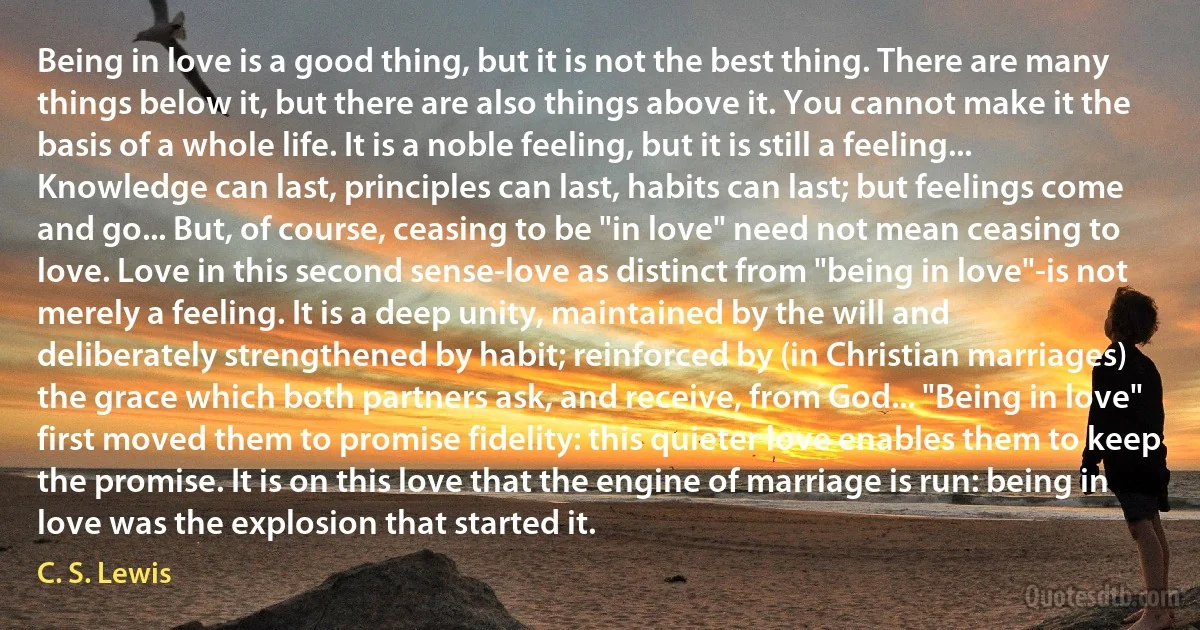
Being in love is a good thing, but it is not the best thing. There are many things below it, but there are also things above it. You cannot make it the basis of a whole life. It is a noble feeling, but it is still a feeling... Knowledge can last, principles can last, habits can last; but feelings come and go... But, of course, ceasing to be "in love" need not mean ceasing to love. Love in this second sense-love as distinct from "being in love"-is not merely a feeling. It is a deep unity, maintained by the will and deliberately strengthened by habit; reinforced by (in Christian marriages) the grace which both partners ask, and receive, from God... "Being in love" first moved them to promise fidelity: this quieter love enables them to keep the promise. It is on this love that the engine of marriage is run: being in love was the explosion that started it.
C. S. LewisRelated topics
above ask best ceasing christian course deep engine good grace habit knowledge last life love marriage mean need noble promise receive run second thing thingsRelated quotes
The Age that admires talk so much can have little discernment for inarticulate work, or for anything that is deep and genuine. Nobody, or hardly anybody, having in himself an earnest sense for truth, how can anybody recognize an inarticulate Veracity, or Nature-fact of any kind; a Human Doer especially, who is the most complex, profound, and inarticulate of all Nature's Facts? Nobody can recognize him: till once he is patented, get some public stamp of authenticity, and has been articulately proclaimed, and asserted to be a Doer. To the worshipper of talk, such a one is a sealed book. An excellent human soul, direct from Heaven,-how shall any excellence of man become recognizable to this unfortunate? Not except by announcing and placarding itself as excellent,-which, I reckon, it above other things will probably be in no great haste to do.

Thomas Carlyle
Cheap grace means grace as a doctrine, a principle, a system. It means forgiveness of sins proclaimed as a general truth, the love of God taught as the Christian "conception" of God. An intellectual assent to that idea is held to be of itself sufficient to secure remission of sins. The church which holds the correct doctrine of grace has, it is supposed, ipso facto a part of that grace. In such a Church the world finds a cheap covering for its sins; no contrition is required, still less any real desire to be delivered from sin. Cheap grace therefore amounts to a denial of the living Word of God, in fact, a denial of the Incarnation of the Word of God.
Cheap grace means the justification of sin without the justification of the sinner. Grace alone does everything, they say, and so everything can remain as it was before.

Dietrich Bonhoeffer
I have loved you ever since. I know full well that you are used to hearing women say that they love you. But I am sure that no one else has ever loved you so lavishly, with such doglike fidelity, with such devotion, as I did and do. Nothing can equal the unnoticed love of a child. It is hopeless and subservient; it is patient and passionate; it is something which the covetous love of a grown woman, the love that is unconsciously exacting, can never be. Non but lonely children can cherish such a passion. The others will squander their feelings in companionship, will dissipate them in confidential talks. They have heard and read much of love, and they know that it comes to all. They play with it like a toy; they flaunt it as a boy flaunts his first cigarette. But I had no confidant; I had been neither taught nor warned; I was inexperience and unsuspecting.

Stefan Zweig
With the advent of medieval Scholasticism, ... we find a clear distinction between theologia and philosophia. Theology became conscious of its autonomy qua supreme science, which philosophy was emptied of its spiritual exercises, which, from now on, were relegated to Christian mysticism and ethics. Reduced to the rank of a "handmaid of theology,” philosophy's role was henceforth to furnish theology with conceptual-and hence purely theoretical-material. When, in the modern age, philosophy regained its autonomy, it still retained many features inherited from this medieval conception. In particular, it maintained its purely theoretical character, which even evolved in the direction of a more and more thorough systemization. Not until Nietzsche, Bergson, and existentialism does philosophy consciously return to being a concrete attitude, a way of life and of seeing the world.

Pierre Hadot
I am a sincere Catholic as it were Corneille, Racine, La Bruyère, Bossnet, Bourdaloue, Fènelon, as were and still are so many of the most of the honor of out science, philosophy and literature, and have conferred such brilliant ustre on our Academies. I share the deep conviction openly manifested in words, deeds and writings by so many savants of the first rank, by a Ruffini, a Haüy, a Laënnec, an Ampere, a Pelletier, a Freycinet, a Coriolis and I avoid naming any of those living, for fear of paining their podesty. I may at least be allowed to say that I loved to recognize all the noble generosity of the Christian Faith in my illustrious friends the creator of Crystallography (Haüy), the introducers of quinine and stethoscope (Pelletier and Laënnec), the famous voyager on board of the 'Urania', and the immortal founders of the theory of Dynamic Electricity.

Augustin Louis Cauchy
